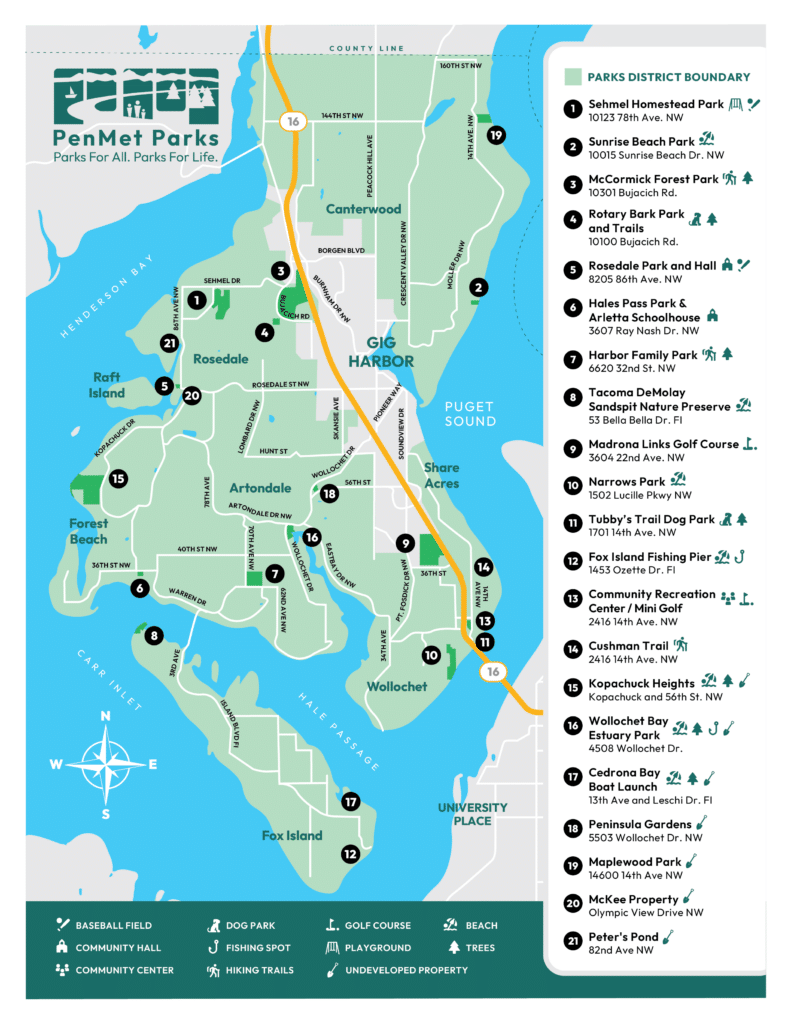Community Government Health & Wellness
PenMet Parks’ new pricing policy generates debate
Registration opened Wednesday, Feb. 7, for PenMet Parks’ youth baseball season. It’s unlikely there will be enough spots for everyone who wants to play.
That’s nothing new. The district’s most popular programs often fill up. What’s different is the way the demand is being addressed.
Policy enacted Oct. 17
The PenMet board passed a new pricing policy on Oct. 17 that requires out-of-district participants to pay a 20% surcharge and wait to sign up until a week after registration opens. Families that pay property taxes to PenMet now have better odds of availing the services they support.
That comes at the expense of players who travel from outside PenMet boundaries, which stretch from the Tacoma Narrows Bridge to the Pierce-Kitsap county line, excluding the Key Peninsula and Gig Harbor city limits.
Seventeen percent are from the city of Gig Harbor and about 13% from the Key Peninsula, according to a fee and services assessment conducted by consultant BerryDunn. Both operate their own park departments, but don’t offer recreational programming.
The policy only applies to fee-based programs and services. PenMet’s many parks can be enjoyed by anyone, as can the city’s and peninsula’s.
Debate about the revision didn’t emerge until this week, when people began registering for programs beginning in April, when it takes effect. On Feb. 3, PenMet posted a reminder on its Facebook page. It elicited 112 comments.
Much discussion on Facebook
Many of the comments dealt with who is and who is not within PenMet boundaries. Others lamented that boundary lines cut through schools and neighborhoods.
Kids on one side can sign up immediately while those on the other must delay and could be left out. Friends might not get to play together as in the past. Some understood why they’d be asked to pay more, but chafed at the prospect of waiting to register and not getting in. Others pondered whether PenMet and city parks should be combined.
One commenter, Carrie Petershagen, who lives within the PenMet district, said her daughter has been placed on waitlists for camps and sports. She sets an alarm to alert her to register early.
“We have a growing community,” she said in a follow-up interview. “Trying to accommodate all the kids is a top priority, but we’re stretched. We don’t have enough field space.
“What I would like to see is the merging of Gig Harbor and PenMet Parks into a greater system so everyone can be accommodated. It’s not fair to the kids. I get it (that non-residents are upset), but they’re also not paying into it.”
Gig Harbor is contemplating a proposal to subsidize its PenMet participants, City Administrator Katrina Knutson said Tuesday, Feb. 6. She will meet with PenMet Executive Director Ally Bujacich Thursday, Feb. 8, and ask if the district would be interested in entering an agreement in which the city buys away the rate and eliminates the delay for its residents.
City contemplating deal
Mayor Tracie Markley has spoken with PenMet board members about it, Knutson said. The City Council will take up the topic at a work session next Thursday, Feb. 15.
“We’re in talks to solve the issue where city residents have to pay more and have a waiting period,” Knutson said. “We’re looking to eliminate that.”
Gig Harbor has $30,000 in its 2023 and 2024 budgets for recreation services.
“We would expect our funding would add additional programming opportunities or capabilities in their district,” said Knutson, who is “hopeful for a mutually beneficial outcome.”
Key Peninsula Parks Director Tracey Perkosky said the district hasn’t heard any complaints yet regarding PenMet’s policy. It will make any future decisions based on feedback from members.
More revenue, more capacity?
Out-district revenues could potentially increase capacity, said PenMet spokeswoman Zemorah Murray. For example, if budget was the limiting resource, additional revenues could be used to expand capacity. The district will need to evaluate the data to understand its impact on program expansion over time, she said.
If PenMet programs could accommodate everybody who wants to participate, there would be no need for priority registration. However, the fee and services assessment found that 82% of those served by the district are youths, and those programs “are first-class and in high demand.” Across 181 programs in 2022, PenMet placed 1,500 kids on waitlists.
Some 1,707 kids attended PenMet youth camps in 2022 while 817 were left wanting. Thirty percent of registrants were non-residents, according to the study. The district accommodated 1,243 in beginning and intermediate youth classes, but 349 failed to get in. Registrants included 21% from outside PenMet boundaries. Youth sports leagues accepted 2,159 players, but disappointed 374 others. Twenty-nine percent of sign-ups were non-residents.
PenMet strives to provide the maximum number of programs within its resources without compromising quality or safety, said Murray. Between 2022 and 2023, it expanded programs by 51%, and increased people served from 1,200 to more than 20,000.
Not enough facilities
Waitlists are the result of limited building, field and gym space, Director of Recreational Services Tracy Gallaway said in October. One of the district’s goals for 2024 is to expand programs by using other buildings, including those of community partners. It completed a facility inventory and is conducting a use analysis.
Efforts in the works could chip away at the facilities gap. PenMet’s community recreation center that’s under construction will house a soccer/football/lacrosse field and three sports courts for basketball, pickleball and volleyball. The city and YMCA are planning six artificially turfed, lighted soccer/football/lacrosse fields that can be configured for baseball and softball. Many organizations outside of PenMet also provide sports and recreation programs. The YMCA and Little League offer baseball leagues, for example.
The parks district considered several factors in the pricing policy, including balancing the needs of the overall community with its obligation to its taxpayers.
“Consistent with the district’s mission to enhance the quality of life by providing parks and recreation opportunities for our community, PenMet Parks is committed to providing services that benefit everyone,” Executive Director Bujacich said. “As demand for our high-quality programs continues to grow, we have taken steps to expand capacity to attempt to meet the demand within available resources. In some cases, we are unable to meet the demand, and as a result, there are wait lists for certain programs. Although everyone is welcome and encouraged to participate, we must balance our ability to meet community demand with our primary responsibility to serve the citizens that reside within district boundaries.”
Surcharges common
The new pricing policy benefits district residents by providing discounted registration fees and priority registration, Bujacich said. When developing it, the district evaluated data including demographics, current program utilization, use of taxpayer dollars and comparable agency practices. The data and the resulting recommendations are in the fees and services assessment on the district’s website.
A BerryDunn review of six comparable park districts found five of six assess a surcharge for non-residents, who pay 15-25% more than residents. Three of the six give priority registration to residents for their summer camp programs. Gig Harbor charges a non-resident rate for paddle craft storage at Ancich Waterfront Park.
Bujacich said the district realizes the new pricing policy is a departure from its past practice and encouraged people to visit the PenMet website or contact the district for more information.





